Medal table
* Host nation (Thailand)
| Rank | Nation | Gold | Silver | Bronze | Total |
|---|---|---|---|---|---|
| 1 | 14 | 16 | 6 | 36 | |
| 2 | 8 | 6 | 6 | 20 | |
| 3 | 7 | 3 | 11 | 21 | |
| 4 | 2 | 3 | 5 | 10 | |
| 5 | 2 | 2 | 1 | 5 | |
| 6 | 0 | 3 | 1 | 4 | |
| 7 | 0 | 0 | 2 | 2 | |
| Totals (7 nations) | 33 | 33 | 32 | 98 | |
Shooting at the 2007 Southeast Asian Games was held at Shooting Range, Sport Authority of Thailand Sport Complex, Bangkok, Thailand.
* Host nation (Thailand)
| Rank | Nation | Gold | Silver | Bronze | Total |
|---|---|---|---|---|---|
| 1 | 14 | 16 | 6 | 36 | |
| 2 | 8 | 6 | 6 | 20 | |
| 3 | 7 | 3 | 11 | 21 | |
| 4 | 2 | 3 | 5 | 10 | |
| 5 | 2 | 2 | 1 | 5 | |
| 6 | 0 | 3 | 1 | 4 | |
| 7 | 0 | 0 | 2 | 2 | |
| Totals (7 nations) | 33 | 33 | 32 | 98 | |
| Event | Gold | Silver | Bronze | |
|---|---|---|---|---|
| 10 m air pistol | Gai Bin | Jakkrit Panichpatikum | Trần Quốc Cường | |
| 10 m air pistol team | Hoàng Xuân Vinh Nguyễn Mạnh Tường Trần Quốc Cường | Kasem Khamhaeng Jakkrit Panichpatikum Noppadon Sutiviruch | Gai Bin Ho Hung Yi Poh Lip Meng | |
| 25 m standard pistol | Prakarn Karndee | Poh Lip Meng | Hoàng Xuân Vinh | |
| 25 m standard pistol team | Prakarn Karndee Pongpol Kulchairattana Pruet Sriyaphan | Gai Bin Poh Lip Meng Rafiee Sairi | Hoàng Xuân Vinh Lê Doãn Cường Nguyễn Mạnh Tường | |
| 25 m center fire pistol | Hoàng Xuân Vinh | Jakkrit Panichpatikum | Nguyễn Mạnh Tường | |
| 25 m center fire pistol team | Hoàng Xuân Vinh Nguyễn Mạnh Tường Phạm Cao Sơn | Gai Bin On Shaw Ming Poh Lip Meng | Virath Chotitawan Kasem Khamhaeng Jakkrit Panichpatikum | |
| 25 m rapid fire pistol | Opas Ruengpanyawut | Hasli Izwan Amir Hasan | Hafiz Adzha | |
| 25 m rapid fire pistol team | Hafiz Adzha Hasli Izwan Amir Hasan Mohd Ridzuan Mohamed | Nguyễn Huy Quang Phúc Phạm Anh Đạt Phạm Cao Sơn | Pongpol Kulchairattana Opas Ruengpanyawut Pruet Sriyaphan | |
| 50 m pistol | Maung Kyu | Jakkrit Panichpatikum | Noppadon Sutiviruch | |
| 50 m pistol team | Saramon Jareangchit Jakkrit Panichpatikum Noppadon Sutiviruch | Gai Bin Ho Hung Yi Poh Lip Meng | Hoàng Xuân Vinh Nguyễn Mạnh Tường Trần Quốc Cường | |
| 10 m air rifle | Jonath Koh Tien Wei | Ong Jun Hong | Emerito Concepcion | |
| 10 m air rifle team | Jonath Koh Tien Wei Ong Jun Hong Zhang Jin | Weerawat Chaisawat Varavut Majchacheep Thanapat Thananchai | Nguyễn Duy Hoàng Nguyễn Tấn Nam Phạm Ngọc Thanh | |
| 50 m rifle prone | Attapon Uea-aree | Lin Aung | Nguyễn Tấn Nam | |
| 50 m rifle prone team | Komkrit Kongnamchok Tevarit Majchacheep Attapon Uea-aree | Aung Nyein Ni Aung Thu Ya Lin Aung | Andy Chee Kwet Chian Kasmijan Kimin Ong Jun Hong | |
| 50 m rifle 3 positions | Nguyễn Duy Hoàng | Varavut Majchacheep | Nguyễn Tấn Nam | |
| 50 m rifle 3 positions team | Nguyễn Duy Hoàng Nguyễn Tấn Nam Vũ Thanh Hùng | Komkrit Kongnamchok Tevarit Majchacheep Varavut Majchacheep | Yahya Ahmad Aqqad Mutalib Hameley Mohd Din Sabki | |
| Skeet | Jiranunt Hathaichukiat | Krisada Varadharmapinich | Eugene Chiew Huan Lin | |
| Skeet team | Jiranunt Hathaichukiat Pitipoom Phasee Krisada Varadharmapinich | Patricio Bernardo Paul Brian Rosario Gabriel Tong | David Chan Eugene Chiew Huan Lin Lee Yee | |
| Trap | Zain Amat | Atig Kitcharoen | Lee Wung Yew | |
| Trap team | Zain Amat Choo Choon Seng Lee Wung Yew | Eric Ang Carag Carlos Jethro Dionisio | Bernard Yeoh Cheng Han Chen Seong Fook Leong Wei Heng | |
| Double trap | Choo Choon Seng | Tan Chee Keong | Athimeth Khamgasem | |
| Double trap team | Zain Amat Choo Choon Seng Tan Chee Keong | Athimeth Khamgasem Yosawat Phakkaanunchai Patrachatra Vichiensun | not awarded | |
| Event | Gold | Silver | Bronze | |
|---|---|---|---|---|
| 10 m air pistol | Warinya Butcha | Tanyaporn Prucksakorn | Nguyễn Thu Vân | |
| 10 m air pistol team | Warinya Butcha Tanyaporn Prucksakorn Wanwarin Yusawat | Đặng Lê Ngọc Mai Đặng Thu Hương Nguyễn Thu Vân | Fan Xiao Ping Pheong Siew Shya Zhao Hui Jing | |
| 25 m pistol | Nguyễn Thu Vân | Tanyaporn Prucksakorn | Warinya Butcha | |
| 25 m pistol team | Đặng Lê Ngọc Mai Đặng Thu Hương Nguyễn Thu Vân | Warinya Butcha Suwaluck Changsanoh Tanyaporn Prucksakorn | Lay Zar Zar Hlaing Khin Soe Thaik Wint May Thu Maun | |
| 10 m air rifle | Jasmine Ser Xiang Wei | Kusuma Tavisri | Thẩm Thúy Hồng | |
| 10 m air rifle team | Thanyalak Chotphibunsin Sasithorn Hongprasert Kusuma Tavisri | Nur Suryani Taibi Shahera Rahim Raja Muslifah Zulkifli | Lê Thị Anh Đào Nguyễn Thị Xuân Thẩm Thúy Hồng | |
| 50 m rifle prone | Than Than Saw | Nur Suryani Taibi | Erlinawati Chalid | |
| 50 m rifle prone team | Haslisa Hamed Nur Ain Ibrahim Nur Suryani Taibi | Thanyalak Chotphibunsin Sasithorn Hongprasert Paramaporn Ponglaokham | Erlinawati Chalid Yosheefin Shila Prasasti Inca Ferry Wihartanti | |
| 50 m rifle 3 positions | Sasithorn Hongprasert | Kusuma Tavisri | Nur Suryani Taibi | |
| 50 m rifle 3 positions team | Thanyalak Chotphibunsin Sasithorn Hongprasert Kusuma Tavisri | Lê Thị Anh Đào Nguyễn Thị Hằng Thẩm Thúy Hồng | Haslisa Hamed Nur Ain Ibrahim Nur Suryani Taibi | |
| Skeet | Sutiya Jiewchaloemmit | Jaqueline de Guzman | Nutchaya Sut-arporn | |

The Southeast Asian Games, also known as the SEA Games (SEAG), is a biennial multi-sport event involving participants from the current 11 countries of Southeast Asia. The games are under the regulation of the Southeast Asian Games Federation with supervision by the International Olympic Committee (IOC) and the Olympic Council of Asia (OCA).

The 1959 Southeast Asian Peninsular Games, officially known as the 1st Southeast Asian Peninsular Games, was the first and inaugural edition of the biennial multi-sport event for Southeast Asian athletes, organised by the SEAP Games Federation. It was held in Bangkok, Thailand from 12 to 17 December 1959 with 12 sports featured in the games. Cambodia, one of the six founding members of the SEAP Games Federation, did not compete at the inaugural edition. For the first time and first among all Southeast Asian nations, Thailand hosted the Southeast Asian Peninsular Games, which later known as the Southeast Asian Games. The games was opened and closed by Bhumibol Adulyadej, the King of Thailand at the Suphachalasai Stadium. The final medal tally was led by host Thailand, followed by its neighbouring countries, Burma and Malaya.

The 1961 Southeast Asian Peninsular Games, officially known as the 2nd Southeast Asian Peninsular Games, was a Southeast Asian multi-sport event held in Rangoon, Burma from 11 to 16 December 1961 with 13 sports featured in the games. This was the first time all six founding members of the SEAP Games Federation competed in the biennial sports festival and the first time Myanmar, then known as Burma hosted the games. Burma, later known as Myanmar is the second country to host the Southeast Asian Peninsular Games, which later known as the Southeast Asian Games after Thailand. The games was opened and closed by Win Maung, the President of Burma at the Bogyoke Aung San Stadium. The final medal tally was led by host Burma, followed by Thailand and Malaya.
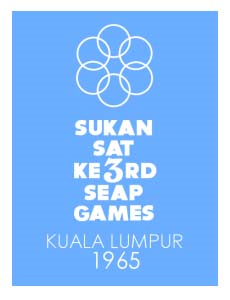
The 1965 Southeast Asian Peninsular Games, officially known as the 3rd Southeast Asian Peninsular Games, was a Southeast Asian multi-sport event held in Kuala Lumpur, Malaysia, from 14 to 21 December 1965 with 14 sports featured in the games. Originally to be hosted by Laos, the third edition of the games was hosted by Malaysia after the former was not able to honour its hosting commitment citing financial difficulties and would later known to have hosted the 2009 Southeast Asian Games decades later. Two years earlier, the third SEAP Games was cancelled as Cambodia pulled out of hosting the event due to internal strife. This was the first time Malaysia host the games. Malaysia is the third country to host the Southeast Asian Peninsular Games, which later known as the Southeast Asian Games after Thailand and Myanmar, then Burma. The games was opened and closed by Ismail Nasiruddin, the King of Malaysia at the Stadium Merdeka. The final medal tally was led by Thailand followed by host Malaysia and Singapore.

The 1967 Southeast Asian Peninsular Games, officially known as the 4th Southeast Asian Peninsular Games, was a Southeast Asian multi-sport event held in Bangkok, Thailand from 9 to 16 December 1967 with 16 sports featured in the games. Cambodia once again declined to host this edition of the games, as it did in 1963. This was Thailand's second time hosting the Southeast Asian Games, and its first time since the 1959 inaugural games. The games was opened and closed by Bhumibol Adulyadej, the King of Thailand at the Suphachalasai Stadium. The final medal tally was led by host Thailand, followed by Singapore and Malaysia.
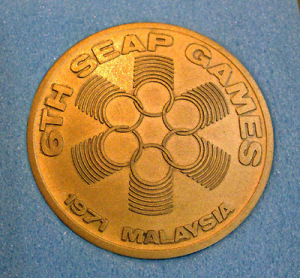
The 1971 Southeast Asian Peninsular Games, officially known as the 6th Southeast Asian Peninsular Games, was a Southeast Asian multi-sport event held in Kuala Lumpur, Malaysia from 6 to 13 December 1971 with 15 sports featured in the games. In this edition of the games, host country Malaysia joined Singapore in pressuring Thailand to let the SEAP Games Federation expand to include the Philippines and Indonesia, but to no avail. Thai officials felt that such expansion would be contrary to the small family affair they had intended the games to be, and would not be in keeping with the close-neighbours spirit the games was supposed to cultivate. This was the second time Malaysia hosted the games and its first time since 1965. The games was opened and closed by Abdul Halim, the King of Malaysia at the Stadium Merdeka. The final medal tally was led by Thailand, followed by host Malaysia and Singapore.

The 1973 Southeast Asian Peninsular Games, officially known as the 7th Southeast Asian Peninsular Games, was a Southeast Asian multi-sport event held in Singapore from 1 to 8 September 1973 with 16 sports featured in the games. This was the first time Singapore hosted the games. Singapore is the fourth nation to host the Southeast Asian Games after Thailand, Burma and Malaysia. The games was opened and closed by Benjamin Sheares, the President of Singapore at the Singapore National Stadium. The final medal tally was led by Thailand, followed by host Singapore and Malaysia.

The 1975 Southeast Asian Peninsular Games, officially known as the 8th Southeast Asian Peninsular Games, was a Southeast Asian multi-sport event held in Bangkok, Thailand from 9 to 16 December 1975. This was the third time Thailand hosted the games, and its first time since 1967. Previously, Thailand also hosted the 1959 inaugural games. South Vietnam, Cambodia and Laos, which only sent token squads made up of military personnel to previous games, declined to participate due to internal political problems. The games is the last games to bear the Southeast Asian Peninsular Games name, before it was renamed the Southeast Asian Games in the next edition of the games. The games was opened and closed by Bhumibol Adulyadej, the King of Thailand at the Suphalachasai Stadium. The final medal tally was led by Thailand, followed by host Singapore, Burma and Malaysia.
The 1979 Southeast Asian Games, officially known as the 10th Southeast Asian Games, was a subcontinental multi-sport event held in Jakarta, Indonesia from 21 to 30 September 1979. This was the first time that Indonesia hosted the games. Indonesia is the fifth nation to host the Southeast Asian Games after Thailand, Burma, Malaysia and Singapore. The games was officially opened and closed by President Soeharto at the Senayan Sports Stadium. The final medal tally was led by host Indonesia, followed by Thailand and Burma.
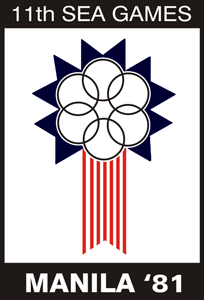
The 1981 Southeast Asian Games, officially known as the 11th Southeast Asian Games, was a multi-sport event held in Manila, Philippines from 6 to 15 December 1981. This was the first time that the Philippines hosted the Games since its first participation in 1977. Philippines is the sixth nation to host the Southeast Asian Games after Thailand, Burma, Malaysia, Singapore and Indonesia. The event was officially opened by President Ferdinand Marcos and the cauldron was lit by Benjamin Silva-Netto. The colourful opening ceremony was held in the Rizal Memorial Stadium in Manila. A new football stadium and indoor arena was built in Pasig named the University of Life Track & Field and Arena or the ULTRA, now called the PhilSports Complex. The adjacent apartments were used as the athlete's quarters and was converted into a BLISS housing project of First Lady Imelda Marcos. The final medal tally was led by Indonesia, followed by Thailand and host Philippines.
The 1983 Southeast Asian Games, officially known as the 12th Southeast Asian Games, or informally Singapore 1983, was a Southeast Asian multi-sport event held in Singapore from 28 May to 6 June 1983. Scheduled to be hosted by Brunei in accordance to the renewed alphabetical rotation of hosting duties, the 1983 SEA Games were offered to be hosted by Singapore as Brunei prepared for its forthcoming independence from the United Kingdom. The games also marked the return of Cambodia, as People's Republic of Kampuchea after an 8-year-long absence since the Khmer Rouge seized power in 1975.

The 1985 Southeast Asian Games, officially known as the 13th Southeast Asian Games, was a Southeast Asian multi-sport event held in Bangkok, Thailand from 8 to 17 December 1985.

The 1989 Southeast Asian Games, officially known as the 15th Southeast Asian Games, was a multi-sport event held in Kuala Lumpur, Malaysia from 20 to 31 August 1989 with 25 sports featured in the games. It was officially opened by 9th Yang di-Pertuan Agong, Sultan Azlan Shah. Although Cambodia did not participate, Laos returned to compete for the first time under the new federation name in this edition of the games. A unified Vietnam first participated in the SEA Games in 1989 as well. The closing ceremony of this multi-sports events coincides with the 32nd anniversary of Malaysia's Independence. This was the fourth time Malaysia host the games, and its first time since 1977. Malaysia previously also hosted the 1965 games and the 1971 games, when the Southeast Asian Games were known as the Southeast Asian Peninsular Games at those times. The games was opened and closed by Sultan Azlan Shah, the King of Malaysia at the Stadium Merdeka. The final medal tally was led by Indonesia, followed by host Malaysia and Thailand.
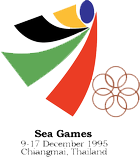
The 1995 Southeast Asian Games, officially known as the 18th Southeast Asian Games, was a Southeast Asian multi-sport event held in Chiang Mai, Thailand from 9 to 17 December 1995. It was the first time that a non-capital city hosted the biennial sports event. Chiang Mai is the second Thai city to host the Southeast Asian Games after Bangkok. The games were opened and closed by Vajiralongkorn, the then-Crown Prince of Thailand. With the return of Cambodia, all ten members of the federation were present to compete in the SEA Games for the first time.

The 2003 Southeast Asian Games, officially known as the 22nd Southeast Asian Games, was a Southeast Asian multi-sport event held in Hanoi, Vietnam. This was the first time for Vietnam to host the Southeast Asian Games and the first time for East Timor, a non-ASEAN member, participated at the Southeast Asian Games.

The 2007 Southeast Asian Games, officially known as the 24th Southeast Asian Games, was a Southeast Asian multi-sport event held in Nakhon Ratchasima (Korat), Thailand. This was the sixth time Thailand hosted the Southeast Asian Games and its first time since 1995. Previously, Thailand also hosted the 1959 inaugural games, 1967 games, 1975 games and the 1985 games.

The 2009 Southeast Asian Games, officially known as the 25th Southeast Asian Games, was a Southeast Asian multi-sport event hosted by Vientiane, Laos. This was the first time Laos had held the Southeast Asian Games as Laos had previously declined hosting the 1965 Southeast Asian Peninsular Games, citing financial difficulties. This was also the first time the Southeast Asian Games was held in a landlocked country.

The 2013 Southeast Asian Games, officially known as the 27th Southeast Asian Games, was a Southeast Asian multi-sport event took place in Nay Pyi Taw, Myanmar. Around 4730 athletes from 11 participating nations competed at the games, which featured 460 events in 34 sports. The games were held from 11 to 22 December 2013.
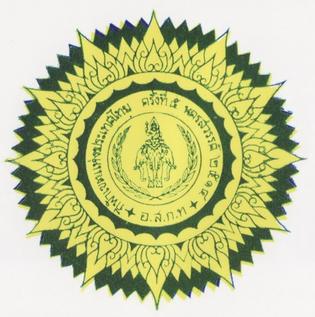
The 5th Thailand National Games were held in Nakhon Sawan, Thailand from 2 to 9 December 1971, with contests in 13 sports. These games were the qualifications of Thai athletes for the 1971 Southeast Asian Peninsular Games held in Kualalumpur, Malaysia.

The 2021 Asian Indoor and Martial Arts Games, officially known as the 6th Asian Indoor and Martial Arts Games and also known as Bangkok–Chonburi 2021, is scheduled to be a pan-Asian multi-sport event in indoor and martial arts sports held from 17 to 26 November 2023 in the Thai capital city, Bangkok and the province of Chonburi. Originally due to take place from 21 to 30 May 2021, the event was postponed in January 2021 as a result of the COVID-19 pandemic. The Olympic Council of Asia (OCA) officially awarded the games to Bangkok and Chonburi Province and signed the hosting rights contract in April 2020.